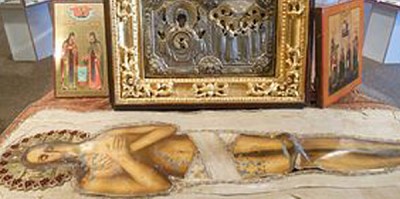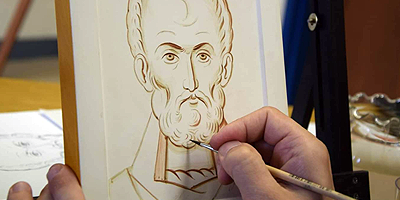History of the Monastery
Address of His Holiness Tikhon, Archbishop of the Aleutians
and North America, Given at the Consecration of St. Tikhon's
Monastery and Church in Pennsylvania, May 17/30, 1906
and North America, Given at the Consecration of St. Tikhon's
Monastery and Church in Pennsylvania, May 17/30, 1906
Through God's helping mercy, the Orthodox Church continues to grow and is strengthened in this land. In various places, Orthodox churches are being erected, parishes, brotherhoods and schools are being organized and a seminary and orphanage are being opened. All the same, the life of our Church here was not yet full: we did not have an institution which, since ancient times, has been the companion of the Orthodox Church and constitutes her adornment. I am speaking of monasteries, in which the Russian land is so rich. And now, glory and thanksgiving to God! This void is now filled, and we celebrate today the opening of St. Tikhon's Monastery and the consecration of the Monastery's first church.
However, is it not a vain dream and a waste of effort and funds to organize a monastery, with its contemplative and eastern way of life, in a land whose inhabitants are known throughout the world for their practical needs, external efficiency and a life-style of worldly comforts? Is this fertile soil for the sowing of monasticism? Will the seed not fall into the thorns among those for whom the cares of this world and the seductions of wealth drown out the word, and it bears no fruit? (Matt. 13:7)
Yet, surely these people cannot be wholly without bursts of idealism, longings for heaven, concerns for "the one thing needful" (Luke 10:42), and a nostalgia for the inner man, overcome by worldly vanity? Let us not hasten to condemn. "For what person knows a man's thoughts except the spirit of the man which is in him?" (I Cor. 2:1 1) "Do not judge by appearances" (John 7:24). Even here there are living souls that thirst for the Lord and long for true, unworldly life.
We know that here, among the non-Orthodox, entire monastic communities exist. If people enter them from amongst those usually considered to be "practical," then we have reason to hope that our monastery will not remain without inhabitants from among the Russian people who have long been noted for their love and attachment to monasteries, their longing for the heavenly, and their detachment from the worldly things of this life.
Let us hope that our monastery, presently small by the number of its brotherhood, will become like the mustard seed, "which is the smallest of all seeds, but when it has grown it is the greatest of all shrubs and becomes a tree, so that the birds of the air come and make nests in its branches" (Matt. 13:32). The hopes and desires of my heart go further: I would like our monastery to become, according to the words of the Savior, "like a leaven which a woman took and hid in three measures of meal, till it was all leavened" (Matt. 13:33).
The future is hidden from man's limited vision, and we do not know at present what will be brought into the life of this land by the constantly increasing wave of Slavic immigration and the gradually growing Orthodox Church. We would like to believe, however, that they will not remain here without a trace, that they will not vanish in a foreign sea, and that they will deposit into the spiritual treasury of the American people the qualities that are peculiar to the Slavic nature and the Russian Orthodox people: a hunger for the spiritual, a passion for the heavenly, a longing for universal brotherhood, concern for others, humility, feelings of repentance, and patience. The most beautiful nursery for the raising of such feelings, for the preservation and increase of this spiritual leaven, is precisely an Orthodox monastery. Therefore, look down from Heaven, O God, upon the Monastery now founded, and behold and visit this vine which you have planted with your right hand, and establish it!
One more word about our monastery. Not far from it stands an orphanage. Is this appropriate next to a monastery? Is it appropriate for monks who have renounced the world to be preoccupied with cares other than the salvation of their souls? Does not even ministering to their neighbors in the world distract monks from their direct goal? These questions have preoccupied the minds of both monastics and non- monastics in our fatherland during recent years. Some see ministering to their neighbors in the world as a mere "side-line" for a monk, as something that is not essential to him, as something that can even be dangerous in certain cases. Others, on the contrary, see the very prayers of the monk and his preoccupations with the salvation of his soul as virtually worthless without any ministering to his neighbor. They consider monks to be selfish and idle people. Who is right? I think that the Synaxarion for Matins of Great Tuesday provides an answer to this question. In it is presented a commentary on the Gospel parable of the Ten Virgins (Matt. 25:1-12).
Our Lord Jesus Christ spoke to His disciples about virginity more than once. There is much glory in virginity. Truly, it is a great thing. But in order that one who fulfills this deed [virginity] might not even think of neglecting the others virtues, particularly charity, through which the light of virginity shines, Christ sets forth the Parable of the Ten Virgins. Five of them were wise, for to their virginity they joined the abundant oil of charity. The other five merely preserved their virginity without the oil of charity. They were called foolish, since they accomplished the greater (virginity) while disregarding the lesser (charity). Thus, in the night of this swiftly-passing life, all the virgins fell asleep: that is to say, they died and came before Christ the Bridegroom. The wise entered through the doors of the bridal-chamber, but to the foolish those doors were shut. They had no oil and were forced to go and buy some. But, just as the stores are not open at night, so were the virgins unable to supply themselves with good deeds after death, especially charity. They went away ashamed, for nothing is sadder or more full of shame than virginity defeated by possessions.
Thus monks cannot save themselves by virginity alone. To it they must add good deeds, especially charity. We see, therefore, that the orphanage is far from superfluous to our monastery. In it the monks can minister to these little ones and, through their own labor and the monastery's income, build their salvation.
I shall end this discourse with the words I spoke to the brotherhood at my first visit to the Monastery. Someone once came to Christ and asked Him: "Good Teacher, what shall I do to inherit eternal life?" "Keep the commandments," answered Christ. "The first and greatest commandment is -- 'You shall love your Lord with all your heart' and the second is like it, 'You shall love your neighbor as yourself' " (Matt. 19:16-17; 22:37-39). If you, brethren, will live by this rule, you shall inherit the earth, the mercy of God, and eternal salvation. Amen.
Monastery of St. Tikhon of Zadonsk
175 St. Tikhon's Road
Waymart, PA 18472
175 St. Tikhon's Road
Waymart, PA 18472
570-937-4067 (Phone)
Sun
23FebLast Judgment
9:10 Hours and Divine Liturgy
4:30 Vespers & MatinsMon
24FebMeat Fast
6:00 Midnight Office, Hours, & Liturgy
4:30 Vespers & MatinsTue
25FebMeat Fast
6:00 Midnight Office, Hours, & Liturgy
4:30 Vespers & Great Compline





